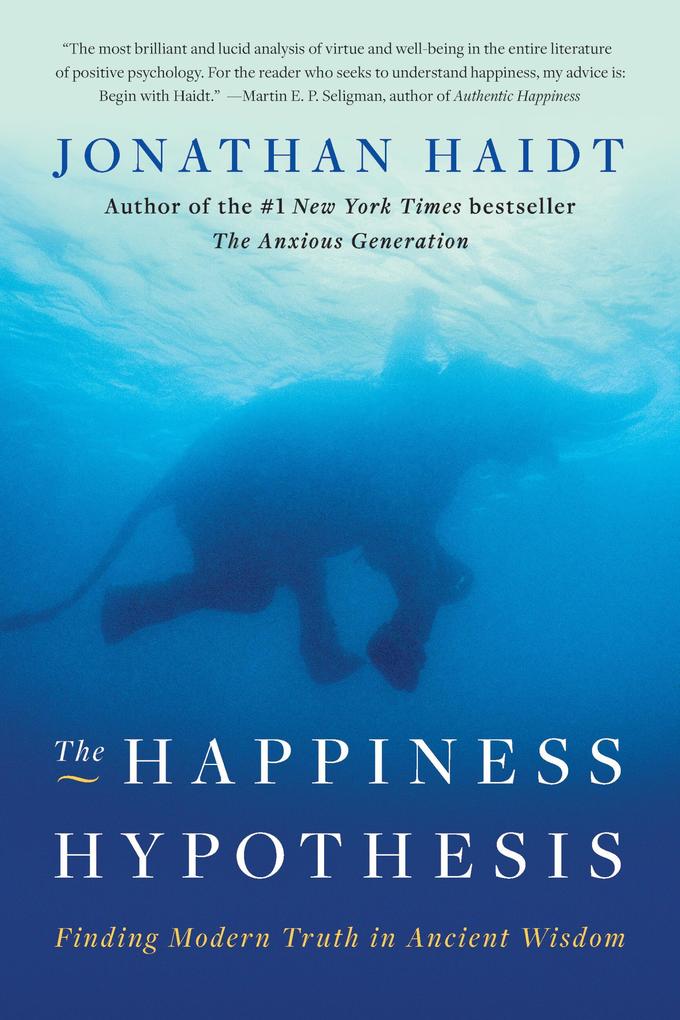
Zustellung: Do, 05.06. - Mi, 11.06.
Versand in 2 Wochen
VersandkostenfreiBestellen & in Filiale abholen:
An award-winning psychologist examines the world's philosophical wisdom through the lens of psychological science
Produktdetails
Erscheinungsdatum
26. Dezember 2006
Sprache
englisch
Seitenanzahl
320
Autor/Autorin
Jonathan Haidt
Verlag/Hersteller
Produktart
kartoniert
Gewicht
340 g
Größe (L/B/H)
228/151/25 mm
ISBN
9780465028023
Pressestimmen
"Library Journal," Best Books 2006
"With singular gusto, Haidt measures ten 'Great Ideas' against past/present research in psychology and science. "LJ" 's verdict: Dr. Phil et al. don't have diddly on the old-school sages. No man is an island, indeed, and no modern reader should be without this carefully considered demystification of life."Darrin McMahon, "The Washington Post""
""[T]he psychologist Jonathan Haidt shows in his wonderfully smart and readable "The Happiness Hypothesis: Finding Modern Truth in Ancient Wisdom" [that] modern science and history have a lot to say to each other.""
"
"Nature"
"This is a delightful book... Haidt's writing embraces spiritual and mystical viewpoints while retaining scientific and rational coherence.""
""
Guardian "(London)
"[A] marvelous book...I don't think I've ever read a book that laid out the contemporary understanding of the human condition with such simple clarity and sense.""
""Psychology Today""Haidt's remedy for the modern glut of frivolous self-help literature is to review and revise the classics, examining the ideas of thinkers like Plato, Buddha and Jesus in light of modern research into human behavior. Along the way, Haidt, a social psychologist, provides practical advice for parenting, romance, work and coping with the political and cultural divisions currently preoccupying the country. The new science he outlines mostly confirms ancient wisdom, but Haidt finds several instances where the two disagree, suggesting that the surest path to happiness is to embrace and balance both old and new thinking.""
""Sunday Times "(London)
"This unusual book sets itself apart from the self-help category with its extensive scientific references, and intelligent, neutral prose, while the author's illuminating illustration of how the human mind works is both educational and refreshing.""
""The Philadelphia Inquirer""Haidt has served up a hearty dish of conventional wisdom, accompanied b
"With singular gusto, Haidt measures ten 'Great Ideas' against past/present research in psychology and science. "LJ" 's verdict: Dr. Phil et al. don't have diddly on the old-school sages. No man is an island, indeed, and no modern reader should be without this carefully considered demystification of life."Darrin McMahon, "The Washington Post""
""[T]he psychologist Jonathan Haidt shows in his wonderfully smart and readable "The Happiness Hypothesis: Finding Modern Truth in Ancient Wisdom" [that] modern science and history have a lot to say to each other.""
"
"Nature"
"This is a delightful book... Haidt's writing embraces spiritual and mystical viewpoints while retaining scientific and rational coherence.""
""
Guardian "(London)
"[A] marvelous book...I don't think I've ever read a book that laid out the contemporary understanding of the human condition with such simple clarity and sense.""
""Psychology Today""Haidt's remedy for the modern glut of frivolous self-help literature is to review and revise the classics, examining the ideas of thinkers like Plato, Buddha and Jesus in light of modern research into human behavior. Along the way, Haidt, a social psychologist, provides practical advice for parenting, romance, work and coping with the political and cultural divisions currently preoccupying the country. The new science he outlines mostly confirms ancient wisdom, but Haidt finds several instances where the two disagree, suggesting that the surest path to happiness is to embrace and balance both old and new thinking.""
""Sunday Times "(London)
"This unusual book sets itself apart from the self-help category with its extensive scientific references, and intelligent, neutral prose, while the author's illuminating illustration of how the human mind works is both educational and refreshing.""
""The Philadelphia Inquirer""Haidt has served up a hearty dish of conventional wisdom, accompanied b
Bewertungen
0 Bewertungen
Es wurden noch keine Bewertungen abgegeben. Schreiben Sie die erste Bewertung zu "The Happiness Hypothesis" und helfen Sie damit anderen bei der Kaufentscheidung.









